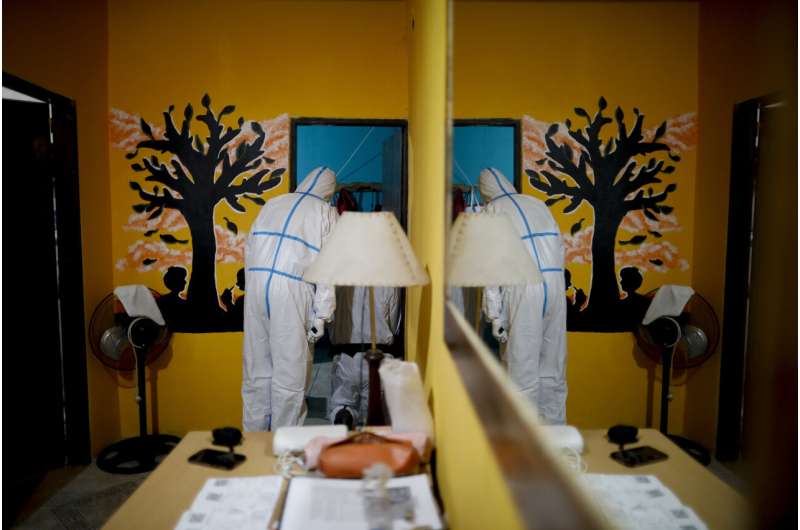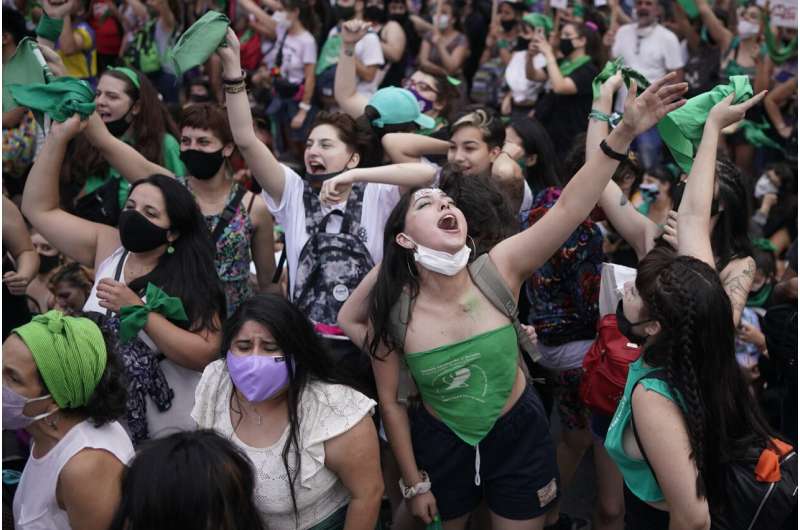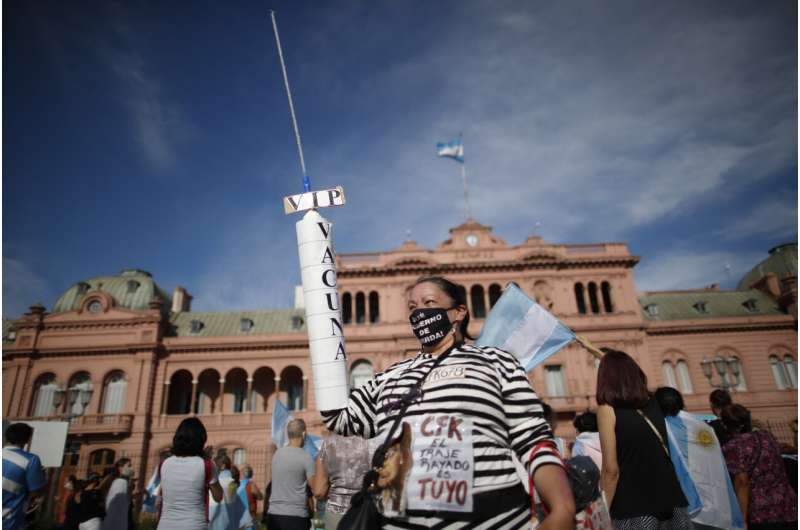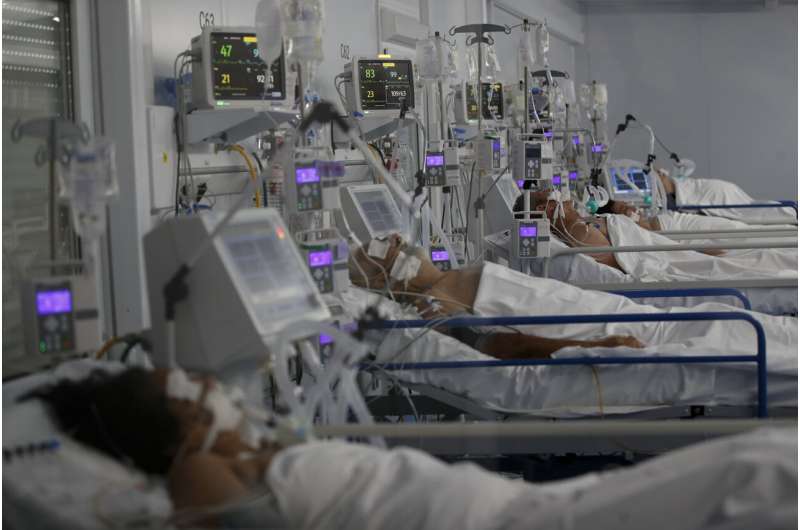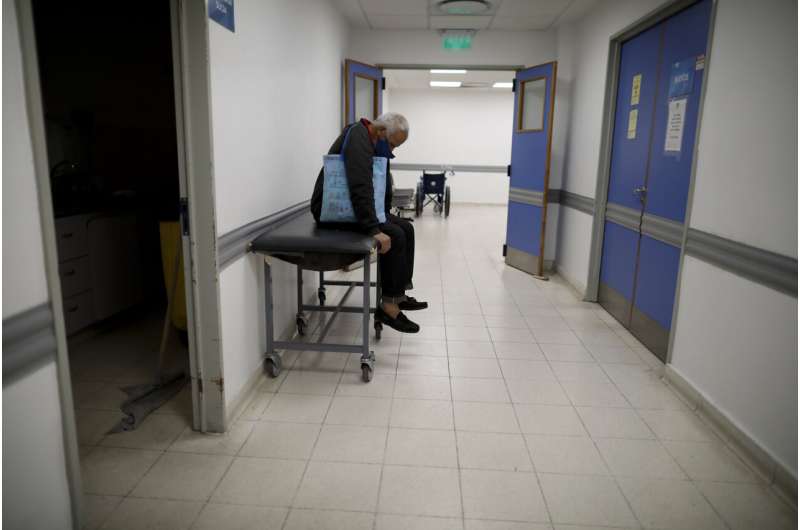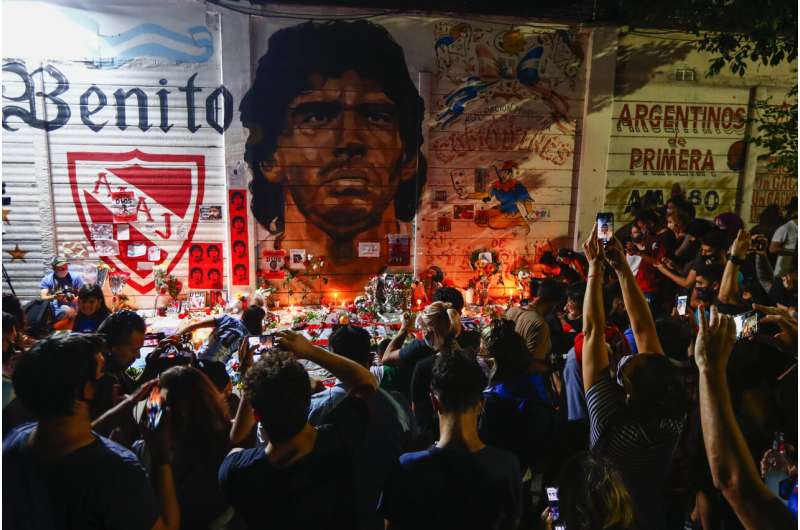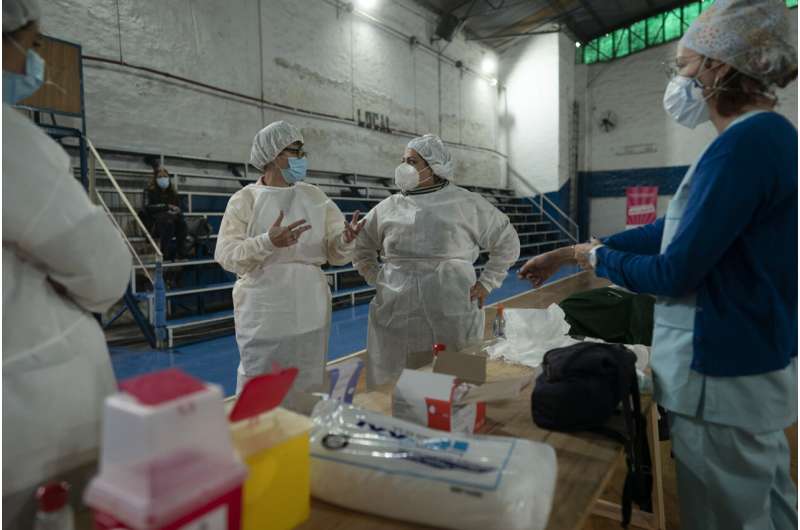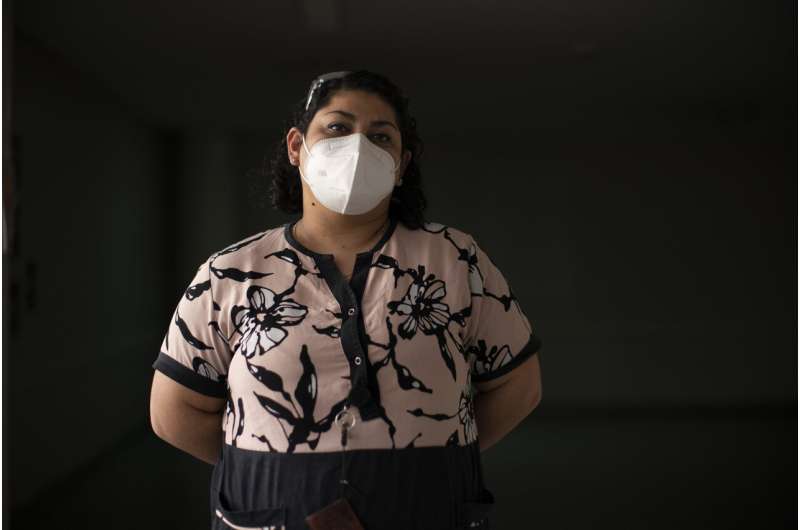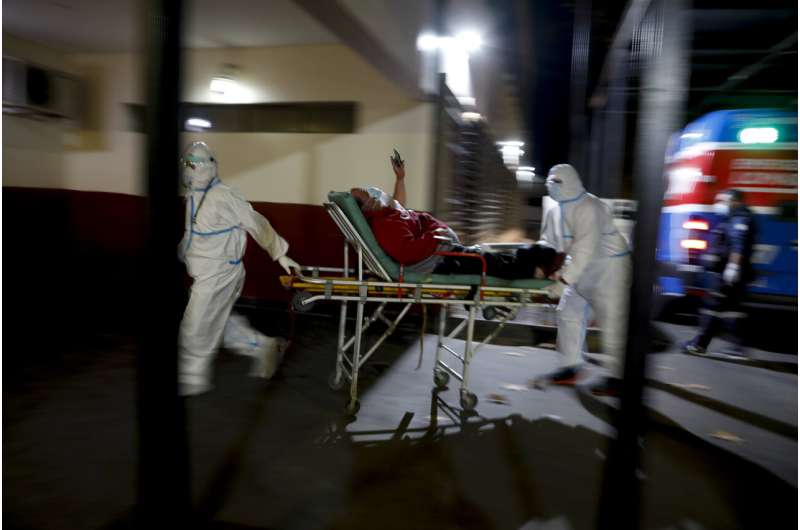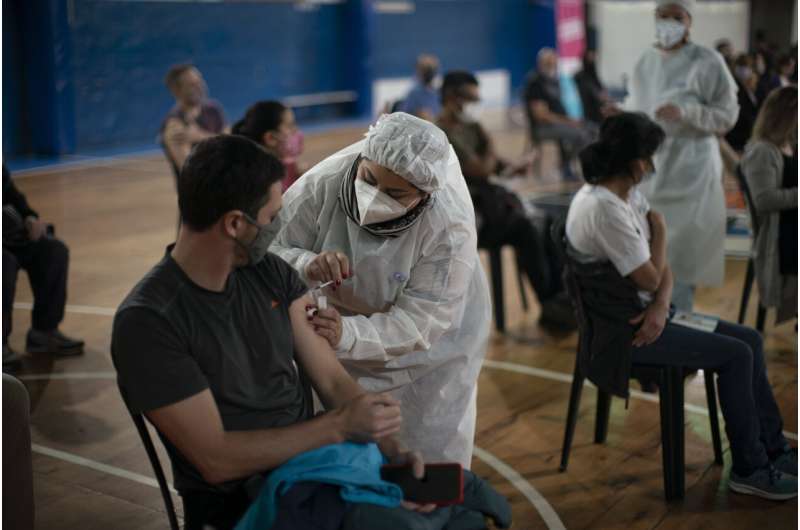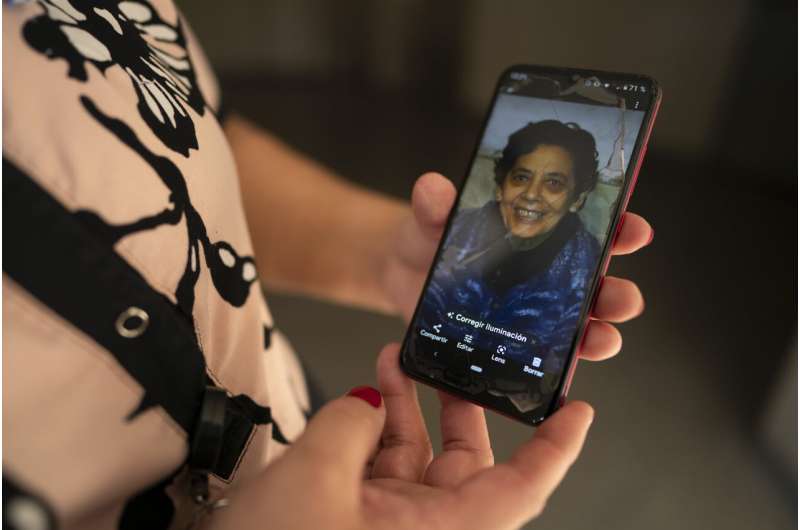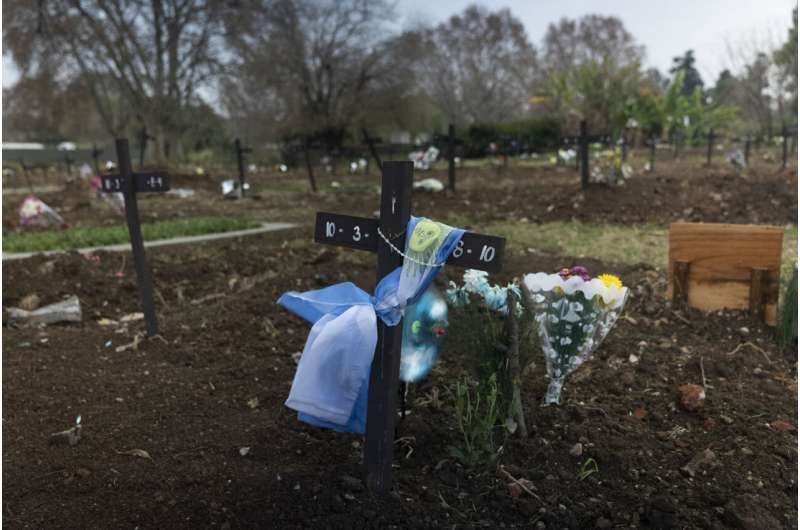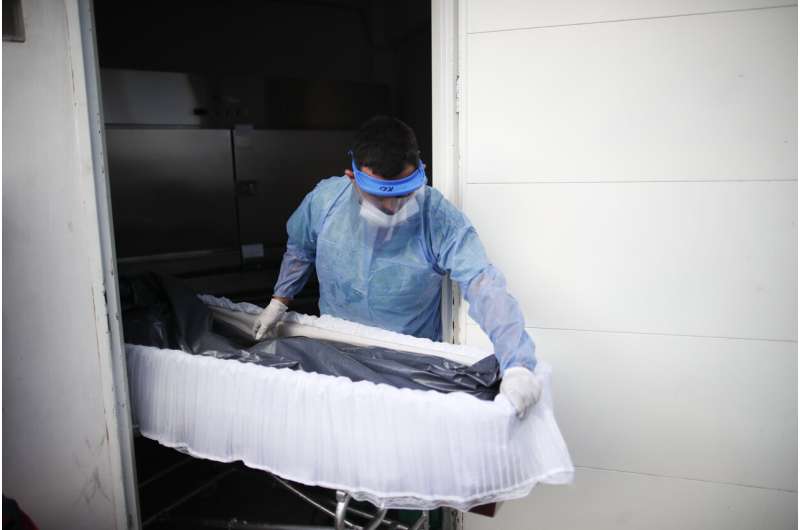In this June 11, 2021 file photo, ambulance worker Claudio Donato, left, reflected in a wall mirror, tries to convince a COVID-19 patient to be taken to a hospital, in Lomas de Zamora, Argentina. The South American country recorded on Wednesday, July 14, 2021, more than 100,000 deaths from COVID-19 since the pandemic began. Credit: AP Photo/Natacha Pisarenko, File
Argentina on Wednesday reported more than 100,000 deaths from COVID-19 since the pandemic began, a heavy blow to a country that intermittently imposed some of the most severe lockdowns in the world, only to see erratic compliance by many people.
Some 614 people died from the disease in the past 24 hours, bringing the total death toll to 100,250, the Health Ministry said.
"I feel bad, it's not what we thought would happen. ... This is a hard, very hard statistic," said Luis Cámera, a doctor who specializes in gerontology and is an adviser on the pandemic to the government of President Alberto Fernández.
Cámera attributed the high toll to ″some errors″ during periodic lockdowns as well damage inflicted by virus variants that swept through the region.
″The Argentine quarantine was prolonged on paper but not on how people behaved," Cámera said.
He was alluding to large gatherings of people that defied social distancing guidance and may have helped spread the virus in late 2020. There were demonstrations over the death of soccer star Diego Maradona and the approval in Congress of a law allowing abortion in most instances.
Cámera added that a second wave of the coronavirus at the end of March "came earlier than it should have come," in part "due to the misconduct of the people and with new, very aggressive variants."
In this Dec. 11, 2020 file photo, abortion-rights activists gather outside Congress in Buenos Aires, Argentina, amid the new coronavirus pandemic. Large gatherings of people that defied social distancing guidance may have helped spread the virus at the end of 2020. Credit: AP Photo/Victor R. Caivano, File
Moreover, Argentina was struggling economically even before the pandemic and many citizens ignored quarantine regulations so they could make a living and support their families.
Then restrictions on gatherings were relaxed over the Christmas holidays and Argentina's southern hemisphere summer, encouraging people to let down their guard and spend time together. The vaccination effort has also been lagging.
The United States has confirmed the most COVID-19 deaths at about 608,000, followed by Brazil (536,000), India (411,000), Mexico (235,000) and Peru (195,000). France, Russia, Britain, Italy and Colombia have each reported well over 100,000 deaths, according to the coronavirus resource center of Johns Hopkins University.
The center said about 4,052,000 people around the world are confirmed to have died from COVID-19. The death toll is believed to be much higher in many countries because of misdiagnoses, inadequate testing and other factors.
In this Feb. 27, 2021 file photo, a demonstrator holds an object representing a syringe during a protest against the government of President Alberto Fernandez and its handling of the COVID-19 vaccines, in Buenos Aires, Argentina. The South American country recorded on Wednesday, July 14, 2021, more than 100,000 deaths from the virus since the pandemic began. Credit: AP Photo/Natacha Pisarenko, File
Argentina has reported more than 4.6 million coronavirus infections. Doctors say many of those who are dying are between 40 and 60 years old and were infected about two months ago, before they had the chance to get vaccinated. The longer the hospital stay, the more likely the chance of increasing health complications and death.
Edgardo Alvites Guerrero, head of intensive therapy at Llavallol Hospital in Buenos Aires, said the pace of the first doses of various vaccines had advanced well lately.
But, he said, ″it is far from ideal″ because it would be best for most people to get two vaccine doses ahead of the expected spread of the more contagious Delta variant.
So far, 15 cases of the delta variant of the coronavirus have been identified in Argentina and were linked to "international travelers" or people related to them, according to the Ministry of Health. Nine cases were detected in the last week and came from the United States, Mexico and Paraguay.
In this May 1, 2021 file photo, COVID-19 patients rest at the Hospital Llavallol in Lomas de Zamora, Argentina. The country has reported a total of about 4.6 million coronavirus infections. Credit: AP Photo/Natacha Pisarenko, File
Argentina has a population of about 45 million. Some 20.6 million people have received a first dose of the three available types of vaccines —- Sputnik, AstraZeneca and Sinopharm—and about 5.1 million have received two doses, according to official figures.
"It is to be expected that a new wave will come ... we are in the calm before the storm," said therapist Gubby Auza while monitoring several COVID-19 patients in an intensive care room at Llavallol. They were all under 60 years old.
Argentine Paola Almirón was hospitalized last year with COVID-19 and survived. Her mother, sister, aunt and brother-in-law died of the disease. On Tuesday, she wept while visiting a cemetery to lay flowers at the graves of her lost family members, a year after their funerals.
"My mother died first, two days later my sister and three days later my aunt. It was terrible going to the cemetery with my brother three times in a week, "said 38-year-old Almirón, a nursing supervisor at the Luisa Cravenna de Gandulfo Interzonal General Hospital in the town of Lomas de Zamora, south of Buenos Aires.
-
In this May 1, 2021 file photo, a man waits in a corridor for news of his wife who is suspected of having COVID-19, at the Hospital Llavallol in Lomas de Zamora, Argentina. Doctors say many of those who are dying of complications related to the virus are between 40 and 60 years old and were infected before they had the chance to get vaccinated. Credit: AP Photo/Natacha Pisarenko, File
-
In this Nov. 25, 2020 file photo, soccer fans hold a vigil for Diego Maradona outside the stadium of Argentinos Juniors soccer club, where he started as a professional footballer, in La Plata, Buenos Aires, Argentina, amid the new coronavirus pandemic. Large gatherings of people that defied social distancing guidance may have helped spread the virus at the end of 2020. Credit: AP Photo/Marcos Brindicci, File
-
Nursing supervisor Paola Almiron, center right, organizes a vaccination campaign at a gymnasium on the outskirts of Buenos Aires, Argentina, Friday, July 9, 2021, as authorities work to speed up vaccinations after a slow start. Almiron was hospitalized last year with COVID-19 and survived. Her mother, sister, aunt and brother-in-law died of the disease. Credit: AP Photo/Victor R. Caivano
-
Paola Almiron, a nursing supervisor poses for a photo at the Luisa Cravenna de Gandulfo Interzonal General Hospital in Lomas de Zamora, south of Buenos Aires, Argentina, Friday, July 9, 2021. Almiron was hospitalized last year with COVID-19 and survived. Her mother, sister, aunt and brother-in-law died of the disease. Credit: AP Photo/Victor R. Caivano
-
In this June 10, 2021 file photo, ambulance workers Vladimir Canal, right, and Claudio Donato, wheel a patient with respiratory problems into the hospital in Lomas de Zamora, Argentina, amid the new coronavirus pandemic. The South American country recorded on Wednesday, July 14, 2021, more than 100,000 deaths from COVID-19 since the pandemic began. Credit: AP Photo/Natacha Pisarenko, File
-
Nursing supervisor Paola Almiron inoculates a man with a dose of the Sinopharm COVID-19 vaccine at a gymnasium on the outskirts of Buenos Aires, Argentina, Friday, July 9, 2021, as authorities work to speed up vaccinations after a slow start. Almiron said she feels some satisfaction whenever she vaccinates someone against COVID-19 and hopes that people will observe masking and social distancing until the pandemic subsides. Credit: AP Photo/Victor R. Caivano
-
Nursing supervisor Paola Almiron shows the photo of her late mother Carmen Aguirre, at the Gandulfo Hospital in Lomas de Zamora, Argentina, Friday, July 9, 2021. "My mother died first, two days later my sister and three days later my aunt. It was terrible going to the cemetery with my brother three times in a week, "said the 38-year-old. Credit: AP Photo/Victor R. Caivano
-
A national flag is wrapped around a cross on a gravesite in the COVID-19 section of the Chacarita cemetery in Buenos Aires, Argentina, Tuesday, July 13, 2021. Recent coronavirus variants have helped spread the disease even faster and the vaccine program, while making progress, is still falling short. Credit: AP Photo/Victor R. Caivano
-
In this April 23, 2021 file photo, a healthcare worker pushes a coffin that contains the remains of a patient who died from COVID-19, at the Dr. Norberto Raul Piacentini hospital, in Lomas de Zamora, Argentina, amid the new coronavirus pandemic. The South American country recorded on Wednesday, July 14, 2021, more than 100,000 deaths from COVID-19 since the pandemic began. Credit: AP Photo/Natacha Pisarenko, File
In an interview with The Associated Press, Almirón said she feels some satisfaction whenever she vaccinates someone against COVID-19 and hopes that people will observe masking and social distancing until the pandemic subsides.
"We waited so long,″ she said. ″We were locked up, we went out, we locked ourselves up again; let's wait a little longer, in a few months, we should all be vaccinated and get out of this.″
© 2021 The Associated Press. All rights reserved. This material may not be published, broadcast, rewritten or redistributed without permission.
